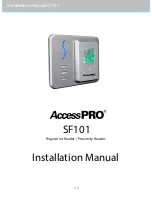
~47~
over the bus and directly controls the transfer of data to the computer’s memory. Bus
mastering is a method of Direct Memory Access (
DMA
) transfer.
Cache –
Cache RAM is an extra holding area for program instructions that need to be
frequently used by the CPU or swapped in and out of RAM. Your CPU can usually
access those instructions from the cache more quickly than it could from a hard disk or
even RAM, so a cache helps the system work more efficiently. Most systems sold today
offer either 256K or 512K cache.
CPU (Central Processing Unit) –
executes all commands and controls the flow of data,
providing the “ brain ” that enables the PC to calculate and perform the operations like
sorting information more quickly than a human is able to. The CPU makes perhaps the
greatest contribution to a PC’s speed and power. Note: Any additional information is
subject to change without prior revision from the supplier.
Table 1 -- CPU Speeds
Processor type
Speed ratings (MHz)
486DX2
66, 80
486DX2
75, 100, 120
Pentium
90, 100, 120, 133, 166, 200, 233
Pentium MMX
166, 200, 233, 266
Pentium Pro
166, 180, 200
Pentium II
233, 266, 300
EIDE (Enhanced IDE) –
It is a hard drive controller that enables your system to be able to
handle fast hard disk drives at a speed of 10Mbps.
EISA or MCA Bus –
Data is transmitted along 32 data lines to adapter cards designed
specifically to work with the 32-bit buses. MCA expansion slots cannot accept 8-bit or
16-bit adapter cards. EISA stands for Extended Industry Standard Architecture, while
MCA stands for MicroChannel Architecture. MCA is architecture used in IBM
Microcomputer.
Expansion slots –
Expansion slots are plug-in connectors that allow you to insert
additional circuit boards that attach to the rest of the PC through special circuitry called the
bus
. By inserting the right circuit board -- usually called an
adapter
or an
expansion
card
– you can increase the resolution and the number of colors used by the display, or
you can transform your PC into a machine for recording and playing music.
Fast SCSI –
The common nomenclature associated with SCSI-2, the second generation of







































